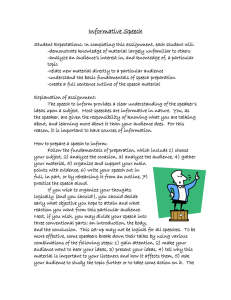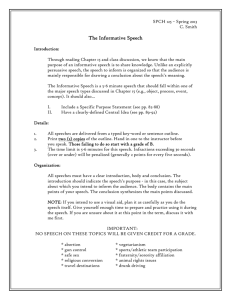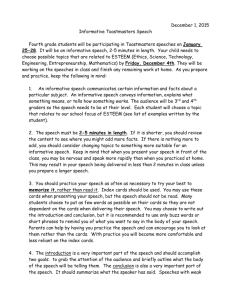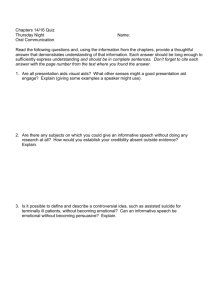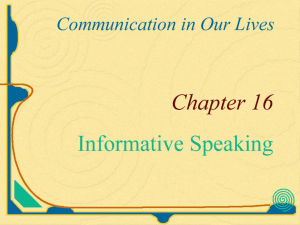Informative Speeches - The University of Southern Mississippi
advertisement
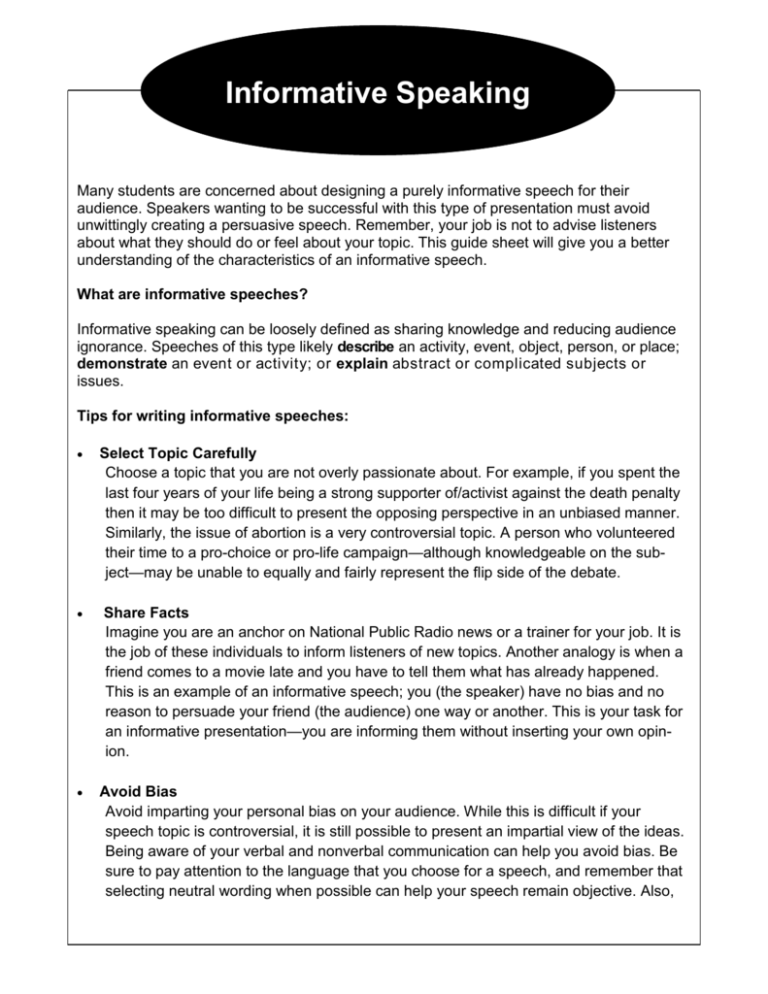
Informative Speaking Many students are concerned about designing a purely informative speech for their audience. Speakers wanting to be successful with this type of presentation must avoid unwittingly creating a persuasive speech. Remember, your job is not to advise listeners about what they should do or feel about your topic. This guide sheet will give you a better understanding of the characteristics of an informative speech. What are informative speeches? Informative speaking can be loosely defined as sharing knowledge and reducing audience ignorance. Speeches of this type likely describe an activity, event, object, person, or place; demonstrate an event or activity; or explain abstract or complicated subjects or issues. Tips for writing informative speeches: Select Topic Carefully Choose a topic that you are not overly passionate about. For example, if you spent the last four years of your life being a strong supporter of/activist against the death penalty then it may be too difficult to present the opposing perspective in an unbiased manner. Similarly, the issue of abortion is a very controversial topic. A person who volunteered their time to a pro-choice or pro-life campaign—although knowledgeable on the subject—may be unable to equally and fairly represent the flip side of the debate. Share Facts Imagine you are an anchor on National Public Radio news or a trainer for your job. It is the job of these individuals to inform listeners of new topics. Another analogy is when a friend comes to a movie late and you have to tell them what has already happened. This is an example of an informative speech; you (the speaker) have no bias and no reason to persuade your friend (the audience) one way or another. This is your task for an informative presentation—you are informing them without inserting your own opinion. Avoid Bias Avoid imparting your personal bias on your audience. While this is difficult if your speech topic is controversial, it is still possible to present an impartial view of the ideas. Being aware of your verbal and nonverbal communication can help you avoid bias. Be sure to pay attention to the language that you choose for a speech, and remember that selecting neutral wording when possible can help your speech remain objective. Also, be aware of your nonverbal signals during the speech. Simply sounding excited about one idea and not another may indicate your support for one over another. Present Balanced Evidence Focus on quality, non-opinionated research for all sides of the issue. If a speaker cites highly credible information for one side of an issue and then cites questionable or unreliable evidence for another, listeners will perceive the speaker’s bias toward the topic. Speakers should be constantly cognizant of the quality of evidence to which they refer. This is especially important when the desire is to fairly represent all sides of an issue. Avoid Persuasion While informative speeches are designed to describe, demonstrate, or explain issues, persuasive speeches are designed to move listeners to act or adopt a perspective. Concerned informative speakers will evaluate their presentations for these signs of persuasive speaking. For example, a speech that informs listeners about the debate on same-sex marriage will explain the status quo and then explain the different perspectives on the issue. When choosing a perspective, be creative, rather than performing a pro/con speech. For example you could discuss same-sex couples’ opinions, religious leaders’ opinions, those who are in favor/opposed, etc. A persuasive speech on the other hand will only have one perspective and attempt to change listeners’ minds. A speaker has done her or his job well if, at the end of the speech, listeners are able to form their own opinion on the topic, while at the same time not necessarily knowing what position the speaker holds. The University of Southern Mississippi Speaking Center www.usm.edu/speakingcenter Written by Michael King & Carl J. Brown


